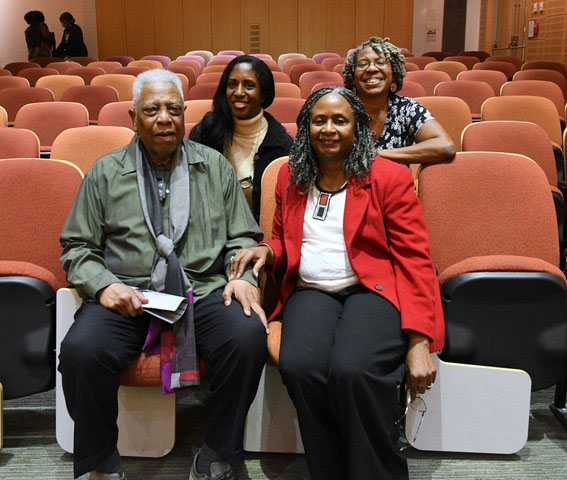Biography
The Enduring Vision of Woodie King Jr.

Celebrated by the Center for Black Literature at Medgar Evers College
By Donna Hill
On Thursday, February 16, the Center for Black Literature at Medgar Evers College, in collaboration with the College’s Black History Month Committee, hosted “Black Cinematic History: The Political and Social Impact of the Films of Woodie King, Jr.” The program centered on the legendary filmmaker and activist while exploring three of his films that remain timeless staples in the annals of film and in society.
King was joined by Carolyn Butts, founder and editor of African Voices, a leading literary magazine devoted to publishing art and literature by artists of color, and founder of the Reel Sisters of the Diaspora Film Festival and Lecture series. Reel Sisters is dedicated to providing artists with opportunities to showcase films produced, directed, and written by women of African, Caribbean, Latino, Asian, Indian, and Native American descent. Reel Sisters has presented over 7,000 films since its inception in 1997.
Scholar Dr. Mia Mask, a Professor of Film at Vassar College, moderated the panel. Dr. Mask teaches African American cinema, Documentary History, seminars on special topics such as horror films, and auteurs like Spike Lee, Charles Burnett, and Ava DuVernay. She teaches feminist film theory, African national cinemas, and genre courses. Her commentary can be heard on NPR.
Following the introduction of her guests, Dr. Mask turned to Mr. King’s long and illustrious career in film. King’s impact on film and his community activism dates back to 1970 when he founded the New Federal Theatre and the National Black Touring Circuit in New York City. He has remained a producing director throughout his career, produced shows both on and off Broadway, and directed performances across the country in venues such as the New York Shakespeare Festival; the Cleveland Playhouse; Center Stage of Baltimore; and the Pittsburgh Public Theatre. His work has earned him numerous nominations and awards over the years, including a 1988 NAACP Image Award for his direction of Checkmates and 1993 Audelco Awards for Best Director and Best Play for his production of Robert Johnson: Trick The Devil; he also received an Obie Award for Sustained Achievement. Additionally, King was awarded an honorary doctorate in humane letters from Wayne State University and a doctorate of fine arts from the College of Wooster. In addition to his directing and producing of theater, King has written extensively about the theater industry; contributed to numerous magazines, such as Black World, Variety, and The Tulane Drama Review; and authored a number of books.
The three films that were the topic of discussion explore various aspects of the complex experiences and challenges faced by Blacks from World War II to the early 1980s, as seen through the lens of King. They document the tireless work and resilience of the civil rights leaders and remind us of the legacy and numerous sacrifices made by men and women in the liberation struggle. These films inspire us and motivate us to persist when the future looks dim.
One of the three films, Torture of Mothers: The Case of The Harlem Six (1980) , stars Ruby Dee, Clarice Taylor, and Novella Nelson. It takes place in 1963 and centers around a group of young Black boys living in Harlem who were involved in an incident that earned them the nickname “The Harlem Six.” Intent on protecting and clearing the names of their sons, several brave mothers bonded to make their stories known. This work emerges as a powerful close-up of police brutality and of power dynamics of 1960s Harlem, a topic that continues to reverberate in our communities.
Much has been written about Malcolm X, from his autobiography to the numerous articles, books, and films about his life. These genres provide the public with a wide-lens view of his life. However, King’s Death of a Prophet (1981) chronicles the last twenty-four hours of Malcolm X, who was assassinated after breaking off from the Nation of Islam. The film stars Morgan Freeman as Malcolm X and Yolanda King (daughter of Martin Luther King Jr.) as Betty Shabazz. This film takes a closeup look into the life and death of one of the Civil Rights era’s most influential members.
Finally, Segregating the “Greatest” Generation (2006), King’s Black “concept” essay documentary features 16 participants between the ages of 70 and 90 who are interviewed about the impact of World War II and how that war changed their lives. They explore the difficulties of being Black and of being artists during and after World War II. Poignant recollections and remarkable stock and archival footage illuminate the way these men, women, and their families were affected by World War II. The film addresses the effects of segregation and discrimination in World War II and the lessons to be learned from that war and beyond.
The issues excavated in these films, while they depict a point in a time gone by, continue to plague, shape and reshape our communities. Participants in the audience, many students, received a historical perspective on the history of Black film and the importance of depicting true life stories and studying the craft. All three films can be viewed at the Medgar Evers College Library. To view the films, visit https://www.mec.cuny.edu/library/ to obtain the schedule.
Donna Hill is Interim Director of Literary Programs at the Center for Black Literature and Assistant Professor of Professional Writing at Medgar Evers College.


